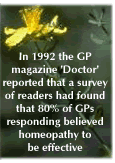There is a growing interest among doctors in complementary therapies. David Reilly (in The Evidence for Homeopathy, Glasgow Academic Departments of Homeopathy) reckons that 75% of GPs want complementary therapies available in the NHS, while the RLHH, in its Patients' Perspectives document, reports increasing interest among junior doctors to train at the hospital. And, following requests from medical students, Glasgow University is teaching homeopathy as part of the undergraduate course19.
Overview
What is Homeopathy
Growth & Popularity
Homeopathy in the NHS
Evidence for Homeopathy
S I T E M A P
H O M E

